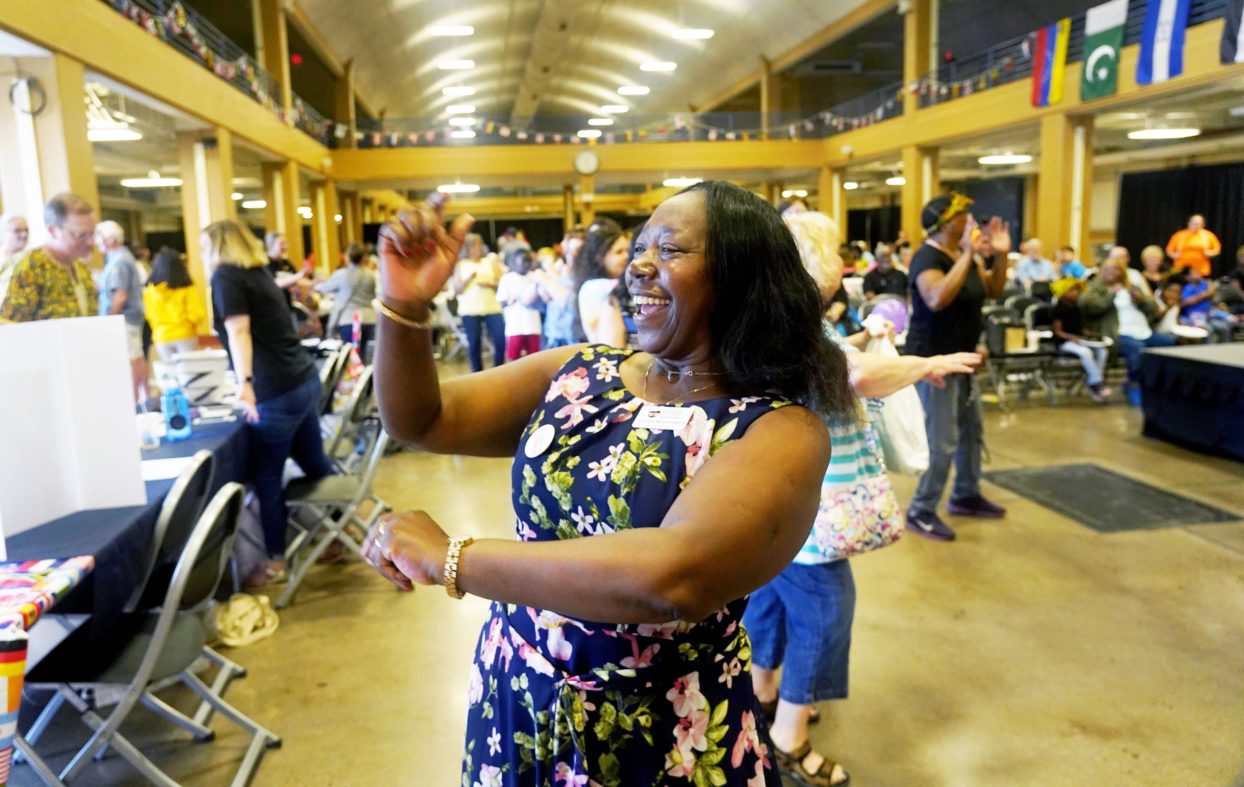Rwandan couple giving back to East Tennessee, which welcomed them as refugees
Story by Bill Brewer
Photography by Stephanie Richer and Michael Patrick
Drocella Mugorewera is a woman of faith. Her name even says so.
She sees God in action everywhere she goes.
And she sees the face of Jesus in everyone she helps as executive director of Bridge Refugee Services, a nonprofit service organization in Chattanooga and Knoxville that helps refugees relocate and integrate in East Tennessee.
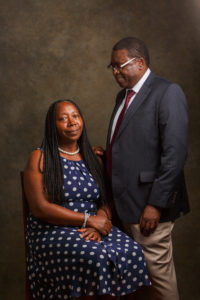
Drocella Mugorewera and Jean Damascene Nkurunziza came to Knoxville fleeing violence in their home of Rwanda.
Through her Catholic faith and personal experience, she knows she also will see the hands, feet, and heart of Jesus in the refugees who settle here from places like Afghanistan, Iraq, Vietnam, Venezuela, Ukraine, Pakistan, Colombia, Myanmar, Burundi, the Sudan, the Democratic Republic of the Congo, Chad, and Rwanda.
The journey of Mrs. Mugorewera, her husband, Jean Damascene Nkurunziza, and their family to the Diocese of Knoxville is an ironic, death-defying one, and not unlike the travails of so many other refugees who venture to the United States seeking safe haven.
It’s through her own personal journey and those of her husband and children that Mrs. Mugorewera is passionate about assisting people fleeing dangerous conditions to find a new home.
Between January 2014 and June of this year, Bridge Refugee Services has resettled 1,409 refugees in the Knoxville and Chattanooga areas, according to Mrs. Mugorewera, who noted that, on average, Bridge resettles about 300 people a year.
The challenges don’t end once a refugee makes it to refuge, such as in East Tennessee. After establishing refugee status and then relocation, refugees often must overcome obstacles in finding housing, employment, and a social community, especially since language frequently is a barrier.
Mrs. Mugorewera explained that a refugee is someone who is forced to leave their country out of fear of being persecuted because of race, religion, nationality, or membership in a particular social or political group, and is unable to return to their country of origin. They can receive refugee status after fleeing their country. With this status, they can enter countries like the United States that welcome them.
There is a legal distinction between refugees, asylum-seekers, and legal or undocumented immigrants. According to the United Nations High Commissioner for Refugees, someone seeking asylum is looking for international protection but whose claim for refugee status has not yet been determined. Immigrants are people who enter a country either with or without legal requirements for entry, such as valid visas or other immigration documentation. These economic migrants normally leave a country voluntarily to seek a better life. If they decide to return home, they would continue to receive the protection of their government, according to the United Nations.
Bridge Refugee Services, which is affiliated with Episcopal Migration Ministries, focuses its assistance on those who already have established refugee and asylum status. Mrs. Mugorewera said, on average, it takes three years to receive refugee status.
“The best way to learn about the refugee situation is from the refugees themselves,” she said. “Our goal is to help them be self-sufficient as soon as possible.”
Experience is often the best teacher, and that certainly applies to Mrs. Mugorewera, who is open about her trek from her native Rwanda to find sanctuary.
She was educated at a university in Kiev, Ukraine, and used her education to serve Rwanda as a director of agriculture, as a permanent secretary in the Ministry of Livestock and Agriculture, and as secretary of lands, environment, forestry, water, and mines.
And she used her position to marshal efforts in restoring peace and justice when the Rwandan Genocide erupted in 1994.
As a member of the Rwandan Parliament in the early 2000s, she helped draft a new Rwandan Constitution, which emphasized human rights, environmental protections, and gender equality in politics. Although changes in government eliminated her position, she continued to be outspoken about the need for reform as a consultant.
Then, in 2008, she was told her life was in danger following years spent pressing for reform. As she was leaving the country to attend a conference, she fled to neighboring Uganda and then Kenya before resettling in Knoxville through assistance from the U.S. refugee admission program and with the aid of Bridge Refugee Services.
She was forced to leave her husband and children behind, but Mr. Nkurunziza was able to flee Rwanda a year later and join her in Knoxville.
Their son and daughter and three nieces followed soon after.
“I am very grateful to God for helping me navigate that troubling time. I didn’t choose to come here. Refugees do not choose where they go. I prayed for good friends and neighbors,” Mrs. Mugorewera said.
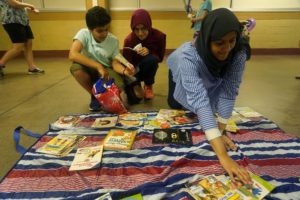
Bridge Refugee Services hosted the 4th annual World Refugee Day Saturday, Jun. 22, 2019 at the Jacob Building in Chilhowee Park.
As part of her resettlement in Knoxville, she became a client of Bridge Refugee Services, which found her shelter, food, a way to support herself, plus helped her integrate into her new community.
“I was thirsty to be reconnected to my Church. I was raised Catholic. My parents were Catholic, and they gave me one of the biggest gifts they can give: my faith. They also gave me the gift of service, service to my neighbors in any way,” she said.
“Bridge took me to Holy Ghost Church. It was like a revival. Monsignor (Xavier) Mankel heard my confession, and I was able to receive Communion again,” she recalled.
Nine months elapsed between opportunities to attend Mass as she sought a new home in a new country, beset with worry about her family in Rwanda.
“During that nine-month period, my routine was praying, showering, and eating; praying, showering, and eating. I didn’t know if I would ever be reconnected with my family again. I carried my Bible, and I asked God for guidance and protection. My prayers were answered,” Mrs. Mugorewera explained. “I had threats for many years. But when I was traveling to the conference there was a serious threat against me.”
She is grateful to God for protecting her, her husband, and the children during that dangerous time, leading them to safety. It was their own exodus.
“It did affect my whole family. You had to do things secretly, and you just find a way to escape, which is risky and difficult, but you take that risk, which is what they did,” she said. “We were just trying to save our lives.”
Mrs. Mugorewera and Mr. Nkurunziza began caring for her nieces when her sister’s husband was killed in the Rwandan Genocide.
Mr. Nkurunziza echoed his wife’s sentiments.
“The journey was so difficult and very stressful. I didn’t communicate with my wife for more than one year, and I had to leave the country and my children behind. Even though I had a passport with a U.S. visa, it was not easy to make the decision and find a way to leave the country,” he said. “But I have joined a free country with plenty of opportunities. I am glad that I can express myself without limitation, and I appreciate the values of democracy and justice.”
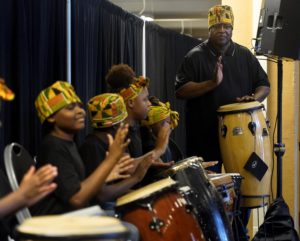
Bridge Refugee Services hosted the 4th annual World Refugee Day Saturday, Jun. 22, 2019 at the Jacob Building in Chilhowee Park.
Once they were reunited in Knoxville, Mrs. Mugorewera, Mr. Nkurunziza, their two children and three nieces lived near Bridge Refugee Services offices in a small apartment. Mrs. Mugorewera fondly recalls Holy Ghost parishioners mobilizing resources to welcome the family, raising $3,000. And Father John Orr, who was then the associate pastor at Holy Ghost, accompanied Mr. Nkurunziza to Memphis for a naturalization process.
The couple and the children, who are all grown and living independently, are now U.S. citizens.
“It was one of the toughest decisions we ever made, but I am glad the USA accepted us as new citizens. My family is trying to thrive within our new communities, and we are giving back,” Mr. Nkurunziza said.
Mrs. Mugorewera relates to all the refugees she and her staff help resettle in East Tennessee, especially when it involves integrating into the community, which was difficult for her and her husband.
Wanting to instill in her children the Catholic values her parents instilled in her, she and her husband enrolled the children in Catholic school. All five were at Knoxville Catholic High School at one time. Mrs. Mugorewera and Mr. Nkurunziza were able to accomplish that through tuition assistance.
She credits the children’s teachers for doing an excellent job in helping them assimilate into the community.
It has been more difficult for Mrs. Mugorewera and Mr. Nkurunziza, who was director of the department for currency and banking operations at the National Bank of Rwanda.
Despite their advanced educations — she arrived in the United States with a master’s degree in agronomy and speaks five languages; he speaks French, English, and Russian in addition to African dialects and has a degree in economics — they struggled to find jobs commensurate with their education and experience.
“It was not easy integrating into the community. We thought we would easily go back to our professional careers. It’s about who you know and connections you have,” Mrs. Mugorewera said. “I try now to advocate for refugees and bring them closer to potential employers. It’s hard for them to have a path to a professional career. But we are developing strong relationships with potential employers.”
Mrs. Mugorewera shared that while people donated material goods to her as she resettled, which she needed and appreciated, she was starving intellectually. Her efforts to feed this vocational hunger led to jobs at Goodwill and then, in 2011, as the multicultural outreach coordinator at Cherokee Health Systems.
In a twist of fate, she was asked in 2015 to be on a panel to interview candidates for the position of Bridge Refugee Services executive director. As the list of initial candidates waned, she decided to become one herself and applied for the position. And she was offered it.
Her husband experienced a similar yearning to return to the business world and financial services. He updated his education by earning an accounting degree from the University of Tennessee and has worked at Clayton Bank and Trust and the Lawhorn CPA Group, where he is a virtual financial officer.
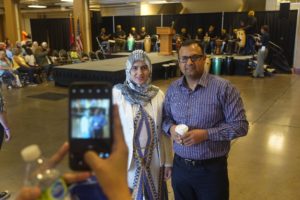
Bridge Refugee Services hosted the 4th annual World Refugee Day Saturday, Jun. 22, 2019 at the Jacob Building in Chilhowee Park.
Both are active in Holy Ghost Parish, where he is in the Knights of Columbus and she is in the Council of Catholic Women. Soon after being reunited in East Tennessee, they were able to move into a Habitat for Humanity home built by the University of Tennessee football team and sponsored by the Haslam Family Foundation. He has volunteered at Habitat for Humanity and is a mentor with the TnAchieves program that is part of the Tennessee Promise Scholarship program for youth.
Mr. Nkurunziza believes that in some respects it has been challenging to integrate into American society.
“When you join a new country without proficiency in the spoken language and culture, you need time to improve your communication skills, create new friends, and build relationships. As I came with a bachelor’s degree in economics and professional experience in banking as well as speaking at a certain level of English, I was hoping it would be easy to get a professional job,” he said. “However, after many attempts of applying for a professional job, I was sometimes told that I was either over-qualified for entry-level jobs, or the hiring system didn’t recognize my professional experience. Therefore, I decided to go back to school at Pellissippi State Community College and the University of Tennessee to pursue an accounting degree. With the support of my friends at Holy Ghost Church and Northside Christian Church, as well as Bridge Refugee Services, the integration was not so bad.”
Mrs. Mugorewera acknowledges that many people who are resettled by Bridge Refugee Services lack education and English-language skills, but they make up for those deficiencies in work ethic and basic skills, as well as an eagerness to learn.
“Language is a big barrier for our clients, as well as the culture shock. I would say more than 90 percent are not educated. But many have some skills. Many have done farming and small trades. We are trying to see the strengths they have and build on those strengths,” she said.
“It’s a diverse population. They are amazing. Even if they don’t speak English, within six months they are employed. They work in the food industry, the hotel industry, in manufacturing, and in the school systems,” she added, noting that almost immediately they begin contributing to the community by working, paying taxes, and buying goods and services. “There is a misconception that immigrants and refugees are taking jobs. There are many jobs that go unfilled and are jobs some Americans do not want to do.”
She said not only are the refugees hard workers, they also can pass drug screens. She hopes that message is getting out, noting that more employers are approaching Bridge for potential employees.
Mrs. Mugorewera is calling for local, state, and national governments to do more to help refugees and those seeking asylum integrate into U.S. society and reach self-sufficiency faster.
She pointed out that the federal cap for refugee settlements has been lowered from 85,000 people annually to 30,000.
She wants to see the number of settlements raised to 95,000 a year. “Traditionally, the United States has the capacity to settle 95,000 refugees a year. It has happened in the past. It can happen again today and tomorrow.”
In addition to partnerships to assist refugees and asylum-seekers that Bridge is building in the community, Mrs. Mugorewera believes faith-based organizations also have a lot to offer them. In addition to foundation partners, she is looking to expand Bridge’s corporate partnerships.
These partnerships aid Bridge programs in Knoxville and Chattanooga, where the office is directed by Marina Peshterianu. Ms. Peshterianu is an immigrant from Ukraine who has been in the Chattanooga office for 20 years. She was a teacher before feeling called to assist Ukrainian refugees resettling in Chattanooga through Bridge Refugee Services.
As she leads the organization that helps immigrants entering East Tennessee as refugees and asylum-seekers, Mrs. Mugorewera continues to lean on her faith to guide her. She prays for those she helps.
“I use my faith and Christian values in my daily life, as a parent, as a community member, as a community leader, because I want to treat people as I wanted to be treated. As a child and when I grew up — even when I got into politics — I wanted to use my faith to help others. Even now I use those values to help manage and to advocate,” she said.
Catholic faith sustained her at her lowest point, and it sustains her now.
“My faith keeps me going when there are struggles and tough decisions to make. Faith can help me untie the knots, and faith gives me hope to not give up. My faith helps me understand suffering. It helps me to be a good servant leader.”

